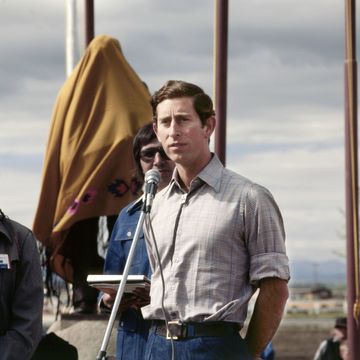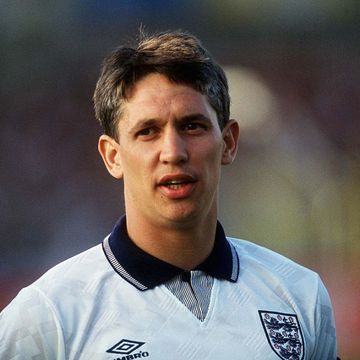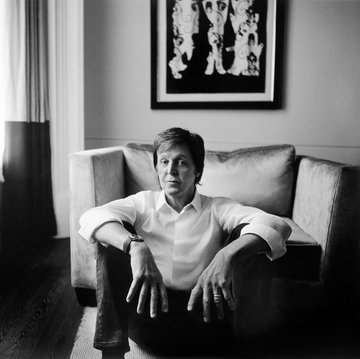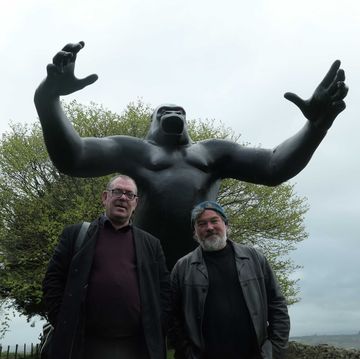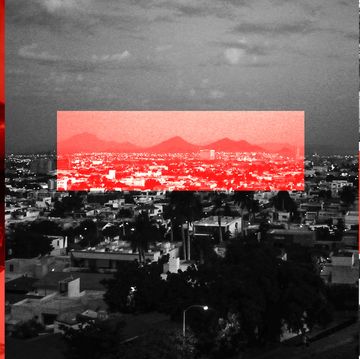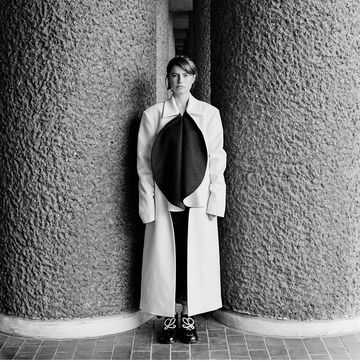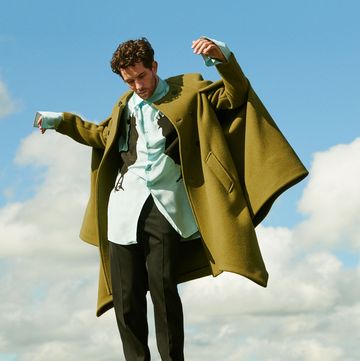Los Angeles is burning. The hills are alive with the roar of wildfires, the worst in the city’s history. But at the Chateau Marmont on Sunset Boulevard all that apocalyptic carry-on seems strangely remote. It’s business as usual here, like a scene from Titanic. Attractive staff deliver drinks, a fat man in a bath towel barks into his mobile phone. And at the corner table, tucked among the ferns, a movie star is giving an interview: Joaquin Phoenix.
It’s perfect, just as I’d pictured it. I can see the headline already: “Phoenix from the Flames”. We could start off by talking about the fires, about the threat of natural disaster in these parts, earthquakes and so on, all the existential questions it raises — Oh, this is going to be a great interview.
Only Phoenix seems supremely indifferent to the subject. Like the hotel staff, he seems all but oblivious of the Roland Emmerich movie unfolding just up the road. “I saw smoke covering the valley, a couple of days ago,” he says, with a shrug. “But I think that’s OK now.”
But Phoenix lives up on Mulholland Drive, overlooking the valley which saw some of the worst fires. Surely he took some precautions? Maybe he hosed down his back yard or hatched an evacuation plan? What about packing a “go bag” like it advises on the Ready for Wildfire website, all those wrenching questions about what to take and what to leave? He shakes his head. You can almost feel the boredom pour off him.
“Earthquake kit?” I ask.
He just shrugs. “Maybe I should get one, I don’t know.”
It must be me. I’m probably overreacting. Clearly these fires aren’t the existential threat I imagine. Or maybe Phoenix is just one of those creative types who’s so absorbed in his art that he misses what’s right in front of him. Who can say? But I know this: the wildfires portion of the conversation is over. That “Phoenix from the Flames” headline just went up in smoke.
We’ve met before for Esquire, Phoenix and I, in 2013, when he was promoting Her, Spike Jonze’s futuristic tale of a lonely writer who falls in love with an operating system. That was at a vegan Thai place in the Valley. “Oh yeah, I remember,” he says unconvincingly. And he hasn’t changed much since. A bit more grey in the beard, perhaps, but still the same reluctant star, hippyish and dishevelled, with an American Spirit on the burn and ash tumbling down his black T-shirt. Never one to spiff himself up without a really good reason, Phoenix arrived today in a dusty SUV and cargo trousers, with a safety pin dangling off the side of his sunglasses because “I haven’t bothered to get the screw put in.”
It makes sense, when I think about it. Phoenix isn’t the type to join a general panic over wildfires, he was never the bandwagon type. And why would he fret about looming disaster when things are going so very well?
“This is the best time of my life,” he tells me, which at 43 isn’t bad. After the last glittering run of movies — The Master, The Immigrant, Her and Inherent Vice — he’s been off the public radar for a couple of years, keeping himself busy making the next batch. And now they’re here — four in total, all due in 2018. If bookies are taking bets on an Oscar win by the end of it (he’s been nominated three times in the past) you may want to get your wallet out.
The first, You Were Never Really Here, directed by Scottish auteur Lynne Ramsay (We Need to Talk About Kevin), has already won him best actor at Cannes in May 2017. More on that in a minute. Then there’s Mary Magdalene by Garth Davis (Lion) in which Phoenix plays Jesus Christ, and Don't Worry, He Won’t Get Far on Foot by Gus Van Sant, which tells the story of Jon Callahan, a quadriplegic cartoonist from Portland, who died in 2010. Both of these films star Rooney Mara, Phoenix’s significant other. (“No, I’m her significant other,” he says.) And he has most recently wrapped The Sisters Brothers, in which he plays an assassin during the 1850s Oregon gold rush, alongside John C Reilly and Jake Gyllenhaal.
Expectations are high. At this point, critics and peers openly speak of Phoenix as possibly the best screen actor of his generation. Bret Easton Ellis recently said as much in The New York Times. Mark Ruffalo has described Phoenix as his “talent crush”. And when I asked some of his recent directors about him, their responses were almost reverential, way beyond the usual luvvie fluff, painting Phoenix as not merely an immense talent, but also a rare human being, profoundly intuitive and kind, who embodies a distinctive form of ethical and creative purity.
Here’s Garth Davis, who directed him in Mary Magdalene: “Working with Joaquin is like working with this beautiful wild animal, where you have to give him the space to be free, so his performance can roam freely: raw, uncontrived and truly natural. If he smells the design of the scene, you lose his free spirit; if the script is weak, he will expose its flaws. He is fiercely intelligent and almost completely instinctual. And he has this immense sensitivity that can be both his curse and his gift, but for me, that is what it means to be human. There was no other person in my mind who could have played Jesus.”
James Gray, who has known Phoenix for nearly 20 years and directed him in four films including Two Lovers (2008) and The Immigrant (2013), describes him as “one of the most incorruptible people I’ve ever known, and the least superficial. He cares about the work and other human beings, and not about the noise. For me, he’s up there with the best actors in movies. He reminds me of Monty Clift, Marlon Brando, the young Al Pacino, or Robert de Niro. He has that kind of fire and intensity, and that craft.”
Naturally, Phoenix shoos all this away, embarrassed. “There’s no empirical evidence!” he protests, in a strained wheezing voice. “It’s all subjective! They don’t know what they’re talking about!”
But these are your peers, I tell him.
“Well, OK. Um... be grateful, right? So, um, nice of you to say! Thanks! But I don’t know that it has any deep meaning for me,” he says. “I’ve never had a moment where I’ve thought, ‘Great, I got this!’ Every time you make a movie, if you’re working with a great film-maker, you’re going to be immediately confronted with your flaws.”
He is so self-deprecating that when I refer to his prize at Cannes, he physically squirms. He had expected “to be crushed” at Cannes, and that this would have been good for him, so when they announced the winner, he wasn’t ready for it at all. All he heard was a bunch of French with his name in the middle, so he stayed in his seat, looking weary of the whole affair (he loathes award shows). Then it dawned that everyone was looking at him. You can see him on the YouTube clip, turning to his girlfriend Rooney and saying, “Do I have to go up?”
The film in question, You Were Never Really Here, is a rattling psychological drama, the likes of which he’s not made before. He plays Joe, a damaged war veteran turned hitman hired to rescue a senator’s daughter from a child sex ring, which he does by battering everyone in the way with a ball pein hammer. Similarities to Taxi Driver (1976) are accidental.
Lynne Ramsay knew from the start that Phoenix was her guy. “I had his picture up on my computer,” she says. “And I was right, you know? He’s amazing. I found my soulmate in making movies.”
He’d never started a movie without first meeting its director — the same goes for Ramsay with her lead actor — but this time was different. They met for the first time when Phoenix showed up to shoot. And it worked. He can’t explain why. They went at a relentless pace, shooting the whole film over 29 days in Brooklyn, with Ramsay rewriting furiously as they went, and Phoenix improvising. “A creative storm,” she calls it.
Phoenix sees Ramsay as a kindred spirit, both of them instinctual and intense, open to experimentation. “Neither of us are very verbal,” he says. “We don’t like to intellectualise about the character. It was all in the doing.” He loved it when she sent him an audio clip of fireworks and gunshots, telling him, “This is what’s going on in [Joe’s] head.” And also the way she let him shoot all kinds of different takes of scenes, whatever he was feeling at the time. (Ramsay says she could cut another three movies with the leftover footage.)
Their understanding was established on day one, when Phoenix hesitated before entering a swimming pool. “It was cold!” he says. “And I don’t like cold water! That’s why my pool at home is totally unused!” So Ramsay got into the water herself, fully clothed. “She beckoned me in and it altered the mood. It was hypnotic. She’s like me, she likes to experience things.”
Ramsay encapsulates why Phoenix gravitates typically to auteurs, or writer/directors. “Lynne’s always chasing something, and that’s who you want to work with,” he says. “Film-makers who have a strong feeling and will pursue it to the end. And auteurs are ultimately responsible for the movie. Some movies, the producer, the studio, they’re all putting in their fucking bits and, you know — fuck that movie!”
And it was fun. Despite the themes of murder, child rape and suicide, Phoenix and Ramsay had a right laugh together. “He doesn’t stay in the Winnebago,” Ramsay says, “he’s out with the crew, taking the piss. That’s his personality.”
I ask Phoenix how it is he can have such a grin when the themes of the movie are so dark, and he embarks on a lengthy anecdote about the time he spent with the fire department for his 2004 film Ladder 49, and how the crew used humour to cope with tragedy. But after a couple of minutes of this, he catches himself. His bullshit detectors are twitching.
“But also, it’s not fucking real. I mean, come on, it’s a movie! Sometimes you do stuff and someone walks through with a tray of sandwiches. More often than not it’s ridiculous, OK? It’s more of an effort to stay in something, because most people are just doing their jobs, they don’t know what scene it is. Sets are jolly.”
This is typical of Phoenix. He takes his work incredibly seriously but he is so averse to pomposity that he’ll deflate or minimise what he does at the first opportunity. When I ask him how he prepared for the role, he throws his hands up. “Look, I want to sound like one of those actors who works really hard and stuff, but honestly? It was reading the script, talking to Lynne, and making shit up. Just like every movie.”
Phoenix has been making shit up since he was a boy. He was 15 when he made his movie debut in Ron Howard’s Parenthood (1989), after a few years of small TV parts. His family had settled in the Valley, having left an itinerant life with the Children of God religious cult, just before it devolved into a mess of sexual abuse and suicide. They changed their surname from Bottom to Phoenix, to symbolise their rebirth, and sure enough, all five Phoenix kids — Leaf, Summer, River, Rain and Liberty — were signed by a talent agent.
It was River, the eldest, who became a superstar, in Rob Reiner’s Stand by Me (1986), and Gus Van Sant’s My Own Private Idaho (1991). But River died of an overdose at the Viper Room in 1993, one of those Hollywood tragedies that will forever be a part of the landscape of the city. And it was his younger brother by four years, Leaf — who had by then changed his name to Joaquin — who made the anguished 911 call. He was 19.
Van Sant was unavailable for this story but few directors know Joaquin quite as well. Having directed River, he launched Joaquin’s career proper in 1995 with To Die For, and Phoenix recognises his influence. “He was the first one to encourage me to find something in the moment,” he says. “He said, if you light a match and it goes out, that’s OK, it’s all part of it. It sounds so obvious now, but at the time, it was so freeing and exciting. He opened the possibility that anything could happen.”
Phoenix went on to star in Gladiator, Quills, Signs, Ladder 49 and Walk the Line, notching up Oscar nominations and a Golden Globe. He was living in New York at the time and taking his work very seriously. He tells me a story he’s told before, about the time an older actor asked him, “What are you doing, going home and reading the script? I’m out banging 20-year-olds every night.” So Phoenix did some partying of his own, which led to rehab and reinvention. “I went to clubs but it was never satisfying,” he says. “I was never really in the scene. I’m not good at small talk. And you could never really talk to anyone anyways.”
So he checked himself into rehab in 2006, prompting all kinds of speculation that he’d gone a bit too method portraying Johnny Cash’s alcoholism in Walk the Line. But that wasn’t it. He’d just tired of the hedonistic life and wanted to change course. He doesn’t consider himself an alcoholic and he still drinks on occasion. As he told The New York Times, “When they started on the 12 steps, I thought, ‘Wait a minute, I’m still going to smoke weed.’”
The true watershed in his career, however, was I’m Still Here, his hilarious 2010 satire about celebrity, a faux-reality documentary about a boorish, self-absorbed actor named Joaquin Phoenix who gives up acting and becomes a rapper. He was so convincing in his bizarre appearance on The Late Show with David Letterman that speculation about a “breakdown” actually derailed his career for a while. What was he up to, people wondered? Even if it was all a joke, why would a leading man portray himself in such an unflattering light, as an overweight bully who does coke and orders hookers? Was he OK?
Today, he says I’m Still Here allowed him to make bolder choices, and the movies that followed, particularly The Master and Her, bear him out. I’m Still Here is a lot of things — funny, brave, original, merciless — and one of the best films he’s made, for my money, standing as a monument to his disdain for modern celebrity. That disdain lingers. It’s no secret he doesn’t enjoy “celebrity” interviews like this one, and the way the format invites self-promotion and insincerity, the phoney pretence that he and I are just a couple of guys having a conversation. Doing press, he says, is like flossing, “It’s just something I have to do.” And from time to time, he still subverts the process. In a later appearance on Letterman, he announced his engagement to a 6ft 2in yoga instructor and revealed he ate raw mesquite grass for his Thanksgiving dinner.
He laughs. “Oh, I know where that came from. I was on a movie, like 20 years ago, and craft services brought around some carrots and celery, and Mark Wahlberg said, ‘Oh, Joaquin’s Thanksgiving.’ A pretty funny joke, actually!” (Phoenix is vegan.)
But his discomfort with interviews is genuine. When I ask him what he does in his spare time, he raises an eyebrow. “Why would I want to tell you?”
Because I’m trying to get a picture of your life, what kind of a guy you are.
He grimaces. “I just... it just makes me feel, ugh... I mean, come on, it’s fucking ridiculous! What am I even going to say? I’m not a coin collector!” He waves his cigarette in the air. “OK, I’ll tell you this. It’s mostly boring. I don’t do a lot of exciting things. I have some friends, I see a movie, and that’s it.”
But if it’s nothing special, why wouldn’t you talk about it?
“Because if things are printed [about] all the beautiful things I get to do, they sound ugly. It’s just a couple of lines for someone to read in their kitchen and...”
It cheapens it.
“Hey, who knows, it might be cheap already.”
This is what I can gather, for what it’s worth (and he’s right, it’s not especially thrilling). He watches a lot of documentaries. Movies, too, of course, but all kinds, Westerns and comedies and action: “I’m not one of those cinephiles who watches Truffaut all day.” He likes to garden; a long-time animal rights activist, he grows his own vegetables. But he’s not some health nut, far from it. There’s no yoga in his day, no hiking, no StairMaster in the garage. He has two dogs, one of which is a sickly old rescue who may not have that long left. He wakes up incredibly early, at 4am sometimes: “I like to get up and do all the stuff I’m not going to tell you about. I get so excited about it,” he says. Bedtime, as a result, is 7.30pm. How he manages a social life on that schedule isn’t clear, but Phoenix is mostly a homebody anyway.
He’s not on social media, so you don’t hear him opine on the many issues that actors opine about like sexual harassment, white supremacy, the environment or police violence. His one public cause is animal cruelty, which he’s passionate about. But on everything else, Phoenix has stayed silent, even when the scandals strike close to home, as with Casey Affleck, his director on I’m Still Here and also his brother-in-law, who was accused of harassment.
According to James Gray, this is just Phoenix’s way and not that he doesn’t care. “We almost never speak about politics or the state of the world,” he says, “it’s almost too much to bear. We talk about music, things in art that we love, our emotional lives.” He says while Phoenix can be intense and charged on camera, off camera he’s a very different person. “He’s actually very tender and sweet and sensitive. It’s almost as if he channels his intensity into the characters. Like the work is an outlet for his darker side.”
Since his home life is off limits, I ask Phoenix about acting. Not that he likes talking about that either, since there’s always the risk of sounding pompous or self-important. But it’s something he can talk about if pushed, although every so often he pauses to say, “God, listen to me! Do you really care about all this stuff?”
And it’s a good question. Do I? I’m not an actor or director, what do I care what he goes through to do his job? But there’s something about it; to hear how truly successful people go about their work can be enlightening. And that’s the case with Phoenix: his approach is inspiring, a recipe for life even, whatever you do for a living. For instance, he’s learned to trust his instincts absolutely.
“I do movies because when I’m reading a script alone at home, I sometimes get this strong feeling in my gut that’s very meaningful to me,” he says. “And on set I’m always trying to capture that feeling of when it was pure. That’s why I get so fucking nervous.”
He knows he’s good, of course, but he never thinks for a moment that he’s “nailed it”. And he’s particularly suspicious of those times when he comes up with something “clever”. Like, say, the headline: Phoenix from the Flames. “Your ego likes the clever shit,” he says. “But when you try it out, it’s always the worst. Totally humiliating.”
He cares very little about the end result. He doesn’t watch himself, he just moves on, hungry for the next experience; all journey and no destination. Lynne Ramsay describes him as “about the process, not the aftermath. There’s a feeling creatively that when he’s done it, it’s over.”
What he craves is the doing, especially those moments when he’s not fully in control. Athletes call it being in the zone, or the flow state. “It’s when you’re not using your brain,” Phoenix says. “Like Michael Jordan, when he made that impossible shot and just shrugged — you know, that iconic shrug? That’s what you want. The feeling that it’s not me any more, I’m just a part of something I don’t understand. That, to me, is nirvana!”
And he chases this like a junkie, with unwavering commitment. James Gray recalls a scene in his Two Lovers, with Gwyneth Paltrow. “I was shooting Joaquin in the bedroom, just before he was going to talk to Gwyneth’s character, and I saw his head moving in a weird way. I couldn’t figure out what he was doing. Then I realised he was masturbating out of frame. He was doing it because it was true to the character. It was about his commitment to the scene. And you cannot ask for more than that from an actor.”
(Phoenix insists this isn’t strictly true, he was only simulating masturbation.)
There’s an enviable simplicity to Phoenix’s life these days. He’s doing his dream job, the same one he’s done all his life. And all he wants to do is to continue. There’s no plan to direct or write, no deviation from the path. He has figured out that his bliss lies in acting, and not in TV or theatre either; they take too long, he’d be stuck playing the same character for six months to a year, when all he wants is to keep moving from role to role. So, he’ll stick with movies, mostly auteur-driven, although he’d happily consider a genre film, even a superhero franchise. (He was apparently tipped to play both Doctor Strange and Lex Luthor in two superhero movies, but the parts went to Benedict Cumberbatch and Jesse Eisenberg.)
It seems so continuous, this career of his, to have refined the same art in an unbroken run since he was a teenager. So I ask him how he’s changed since he started out. And he sighs. It’s one of those big questions that he’s loath to answer, because life’s just too complex and mysterious to distil into some pithy quote in a magazine article. And yet, he doesn’t want to leave me empty-handed. He wants to help. This is the conundrum of these interviews for Joaquin Phoenix. He lights another cigarette.
“I’ve realised that very often the way I think things should go just isn’t right, to be honest. So I’ve become more open to experiencing things as they actually are, and not trying to control everything. It’s the same with acting. You can prep all you want, and it’s fun thinking about how this person’s going to react and whatever, but — and I don’t want to sound like a cunt here — but now I’m better at just letting the movie be what it wants to be. I’m more excited to discover how things are going to transpire in life.”
I’m getting it now. The lesson I’m meant to learn from all this. Amy Adams once told me that working with Phoenix on The Master and Her in succession taught her “to not get caught up in what’s planned, but to just be free and present in the moment”. I came here today full of ideas about how our conversation might turn out. We’d start off with wildfires, and go from there, I had it all figured out. But look, it’s fine, we’ve been chatting for well over an hour. And what’s more, the fires have actually been tamed. The wind has dropped, there hasn’t been a single emergency alert on my phone.
“In your twenties, you’re auditioning for things you’re certain of, and when they don’t happen, you’re like, ‘Fuck!’ But then years later you look back — and who knows how life would have turned out if that did happen? — but, fuck me, I’m just really happy with where life is at right now, you know?”
And on that wonderfully expansive note, Phoenix groans, looking faintly disgusted with himself. “Oh God, listen to me. You do realise I’m just trying to give you an answer here, right? I don’t really believe any of this shit.”
You Were Never Really Here is out on 9 March



